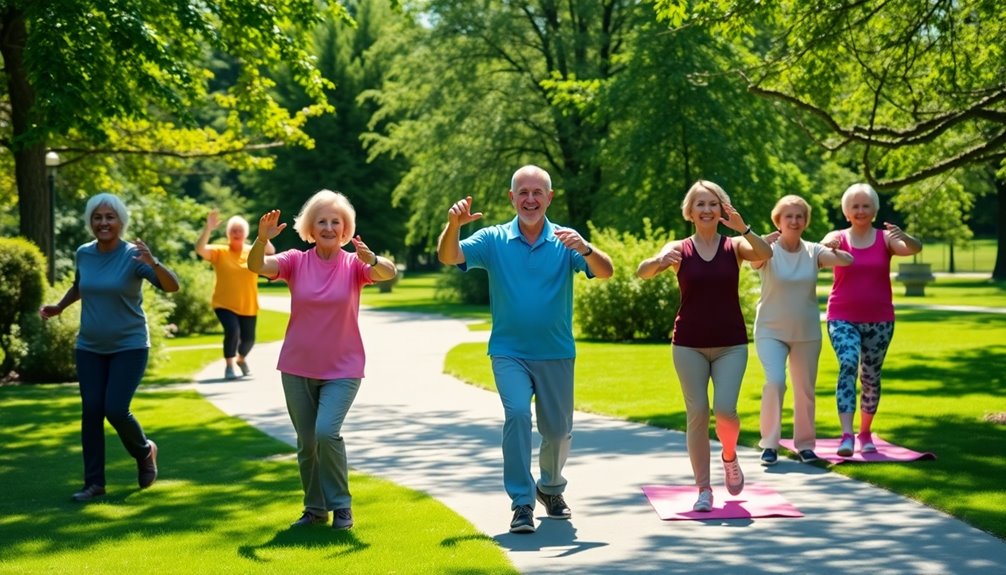To sustain wellness in seniors, focus on a balanced diet rich in fruits, vegetables, whole grains, and lean proteins. Aim for 150 minutes of moderate exercise each week to boost your mood and keep your mind sharp. Keep track of your calcium and vitamin D intake for strong bones, and limit sodium to support heart health. Don’t forget the importance of social connections; they uplift your mental well-being. Discover more essential tips for a healthier lifestyle! Additionally, prioritize regular health check-ups to monitor any existing conditions and catch potential issues early. It’s also vital to consider financial planning for elderly care, as this can alleviate stress and ensure access to necessary resources and support. Engaging in hobbies and activities that spark joy and fulfillment can further enhance overall well-being in later years.
Key Takeaways
- Maintain a balanced diet rich in fruits, vegetables, whole grains, and lean proteins to meet changing nutritional needs.
- Engage in at least 150 minutes of moderate-intensity exercise weekly to enhance cognitive function and reduce fall risk.
- Foster social connections through community activities and technology to combat isolation and boost mental well-being.
- Monitor hydration and calcium intake to support bone health and prevent osteoporosis as thirst sensation decreases with age.
- Incorporate cognitive exercises, like puzzles, along with physical activities to improve brain function and memory retention.
Importance of a Balanced Diet

A balanced diet is fundamental for seniors, especially since your nutritional needs change as you age.
To maintain your health and energy, focus on incorporating a variety of fruits, vegetables, whole grains, lean proteins, and low-fat dairy. This guarantees you get the essential nutrients you require, like calcium and vitamin D, which are critical for bone health and preventing osteoporosis.
It's important to limit processed foods, excessive sodium, and added sugars to reduce the risk of chronic diseases such as hypertension and diabetes.
Start your meals with vegetables to promote healthy eating habits and enhance fullness while maximizing nutrient intake. Including educational toys in your daily routine can also stimulate cognitive growth and support overall wellness.
Benefits of Regular Physical Activity

Regular physical activity isn't just about staying fit; it's key to boosting your brain power and enhancing your mood.
By getting active, you can cut your risk of falls and improve your emotional well-being.
Plus, keeping your body moving helps sharpen your cognitive function, making daily life more enjoyable and independent. Additionally, engaging in activities like walking or yoga can be complemented by certain teas linked to reduced dementia risk, further supporting your mental health.
Cognitive Function Improvement
While staying physically active, you can greatly boost your cognitive function and reduce the risk of Alzheimer's disease or dementia by nearly 50%. Engaging in regular physical activity, like walking or swimming, enhances brain function and memory retention.
Aim for at least 150 minutes of moderate-intensity exercise each week to promote neurogenesis, which helps grow new neurons essential for cognitive health. An active lifestyle not only slows cognitive decline but also supports emotional well-being, keeping your mind sharp and engaged.
Activities such as gentle yoga can improve both physical fitness and mental agility. Additionally, incorporating mindfulness practices into your routine can further enhance your mental clarity and focus. Embracing these habits guarantees you maintain your cognitive function, enhancing your quality of life as you age.
Fall Risk Reduction
To reduce your risk of falls, staying active is essential. Regular physical activity enhances your balance and flexibility, leading to a 23% decrease in fall incidents among seniors.
Engaging in muscle-strengthening exercises, such as tai chi, is important for maintaining stability and preventing falls. The CDC recommends at least 150 minutes of moderate-intensity aerobic activity each week, along with strength training on two or more days.
Activities like walking, swimming, or gentle yoga not only improve your physical health but also boost cognitive function, reducing the risk of conditions like dementia that can affect balance. Additionally, jet fuel exposure has been linked to increased risk of hearing impairment, emphasizing the importance of overall health monitoring in seniors.
Enhanced Emotional Well-being
Engaging in physical activity not only keeps you fit but also greatly enhances your emotional well-being. Regular exercise boosts serotonin levels, helping alleviate symptoms of depression and improving your mood.
Aim for at least 150 minutes of moderate-intensity aerobic activity each week to considerably reduce stress and anxiety. This commitment to physical activity also supports good mental health and cognitive functions, cutting the risk of dementia and Alzheimer's disease by nearly 50%.
Plus, participating in group exercises fosters social connections, which can combat feelings of loneliness and isolation. Ultimately, these benefits contribute to your overall well-being and quality of life, making physical activity essential for maintaining emotional health as you age.
Nutrition Tips for Seniors

As you age, prioritizing a balanced diet becomes vital for maintaining your health and vigor. Proper nutrition can help support your overall health, so consider these nutrition tips for seniors:
- Incorporate a Variety of Foods: Aim for a mix of fruits, vegetables, whole grains, lean proteins, and healthy fats. This variety guarantees you get essential nutrients.
- Stay Hydrated: Drink plenty of water throughout the day to stay hydrated, as your thirst sensation may diminish with age.
- Watch Portion Sizes: As metabolism slows, be mindful of portion sizes to prevent weight gain and promote better digestion. Additionally, proper nutrition is essential for brain development, which can enhance cognitive function and emotional well-being in seniors.
Incorporating Calcium and Vitamin D

To keep your bones strong, it's essential to incorporate enough calcium and vitamin D into your diet.
You can find calcium in low-fat dairy, leafy greens, and fortified foods, while vitamin D helps your body absorb that calcium effectively.
Sources of Calcium
Calcium plays an essential role in keeping your bones strong and healthy, especially as you age. To maintain bone health and prevent osteoporosis, aim for 1,200 mg daily if you're a woman or 1,000 mg if you're a man aged 70 and older.
Here are some excellent sources of calcium:
- Low-fat dairy products: Milk, yogurt, and cheese provide considerable calcium in a single serving.
- Fortified plant-based alternatives: Options like almond milk and soy milk often have added calcium, perfect for lactose intolerance.
- Leafy green vegetables: Kale, collard greens, and broccoli not only offer calcium, but also additional nutrients for your overall health.
Additionally, consider incorporating chia seeds into your diet, as they are a rich source of dietary fiber that aids digestion and supports overall health.
Incorporating these foods into your healthy lifestyle can considerably benefit your bone health.
Role of Vitamin D
Vitamin D is a key player in maintaining strong bones, especially for seniors. It's essential for calcium absorption, which helps support bone health and overall liveliness. A daily intake of 800 to 1,000 IU of vitamin D, alongside 1,200 mg of calcium, can greatly reduce the risk of fractures and falls. This combination also enhances mobility and contributes to a healthy weight. Additionally, early detection of potential health issues, such as breast cancer, is critical for maintaining overall wellness in seniors.
| Source | Vitamin D (IU) | Calcium (mg) |
|---|---|---|
| Fatty Fish | 500-1,000 | 18-25 |
| Fortified Milk | 100-150 | 300 |
| Egg Yolks | 40 | 0 |
| Leafy Greens | 0 | 150-200 |
| Supplements | 1,000-2,000 | 0 |
Incorporating these nutrients into your diet is crucial for maintaining health and wellness as you age.
Importance for Bone Health
Bone health is essential for seniors, as it directly impacts mobility and overall quality of life.
To maintain strong bones and reduce the risk of osteoporosis and fractures, focus on these key areas:
- Calcium Intake: Aim for about 1,200 mg daily from low-fat dairy, leafy greens, and fortified foods.
- Vitamin D: Get at least 800 to 1,000 IU daily through sunlight, diet, and supplements to enhance calcium absorption.
- Exercise: Engage in regular weight-bearing and muscle-strengthening exercises to boost bone strength and lower fall risk.
Additionally, incorporating protein-rich meals can support overall health and aid in muscle maintenance, which is vital for bone integrity.
Limiting Sodium Intake

As you age, limiting sodium intake becomes increasingly important for maintaining heart health. Excessive sodium can lead to high blood pressure, raising your risk of heart disease and stroke.
The American Heart Association recommends aiming for no more than 2,300 milligrams of sodium daily, ideally reducing it to 1,500 milligrams for better health outcomes.
To control sodium levels, read nutrition labels and choose lower-sodium options, especially in processed foods. Cooking at home with fresh ingredients allows you to monitor sodium intake effectively. Use herbs and spices as flavorful alternatives to salt.
Regularly monitoring your sodium intake can greatly improve your overall health, as studies show that reducing sodium may lower blood pressure by 5-6 mmHg in individuals with hypertension. Additionally, individuals with emotional dysregulation may find that maintaining a balanced diet, including low sodium intake, can help manage their overall emotional well-being.
Exercise for Senior Wellness

Regular exercise is essential for maintaining wellness as you age. It offers numerous health benefits that enhance your overall health and wellness. Aim for at least 150 minutes of moderate-intensity activity weekly.
Here are three key areas to focus on:
- Cardiovascular Health: Activities like walking and swimming boost your heart health.
- Muscle Strengthening: Incorporate exercises at least twice a week to maintain good bone density and reduce the risk of osteoporosis.
- Balance and Flexibility: Engage in yoga or balance exercises to lower fall risks and promote independence.
Additionally, regular physical activity can improve your sleep patterns and contribute to better overall health. Don't forget, participating in group classes provides social support, enhancing mental well-being.
Combating Social Isolation

While many people might not realize it, social connections are essential for seniors' health and well-being. Combatting social isolation can greatly enhance your mental health. Engaging in community activities, like book clubs or exercise classes, fosters regular social interactions and reduces feelings of loneliness. Technology can also bridge the gap; using video calls helps you stay connected with loved ones.
Here's a quick reminder of the impact:
| Positive Connections | Consequences of Isolation |
|---|---|
| Sense of purpose | Increased rates of depression |
| Enhanced overall well-being | Cognitive decline |
| Volunteer opportunities | Higher mortality risk |
Mental Health of Seniors

Mental health is essential for seniors, with about 20% of adults aged 55 and older facing issues like depression and anxiety.
To support your mental well-being, consider the following:
- Engage in cognitive exercises: Activities like puzzles or learning new skills can help reduce cognitive decline and enhance overall health and wellness.
- Prioritize social interactions: Maintaining strong social connections can lower your risk of dementia by 50%, improving both mental health and cognitive function.
- Stay active: Regular physical activity not only boosts your physical and mental health but also alleviates stress and enhances mood.
Support for Mental Health

Staying connected with friends and family is essential for your mental health.
Engaging in meaningful activities, whether it's a hobby or volunteering, can boost your mood and overall satisfaction with life.
Let's explore how these connections and activities can support your well-being.
Importance of Social Connections
Social connections play a crucial role in maintaining your mental health as you age, helping to combat feelings of loneliness and isolation that can lead to serious health risks.
Here are three key benefits of nurturing those connections:
- Reduced Loneliness: Regular interactions can greatly lower feelings of loneliness and social isolation, boosting your emotional well-being.
- Cognitive Benefits: Engaging with others through community activities can enhance your cognitive function and may lower the risk of dementia.
- Supportive Networks: Building relationships provides essential emotional support, giving your life more purpose and fulfillment.
Don't underestimate the power of technology, either! Video calls and social media can help you maintain connections with loved ones, ensuring you lead a more fulfilling life.
Engaging in Meaningful Activities
Nurturing your social connections naturally leads to exploring activities that bring joy and fulfillment. Engaging in meaningful activities like volunteering or pursuing hobbies not only enhances your mental well-being but also reduces feelings of isolation.
Creative pursuits such as painting or writing can boost your cognitive health and emotional resilience. Regular social engagement in clubs or groups markedly improves cognitive function, decreasing dementia risk by 30% among active seniors.
Activities that challenge your mind—like puzzles and games—enhance memory retention and mental agility. By embracing lifelong learning opportunities through classes or workshops, you foster intellectual growth while enjoying social interaction, which is essential for maintaining your overall happiness and health.
Maintaining Social Connections

While many factors contribute to overall health, maintaining social connections plays an essential role in your well-being as a senior. Strong social networks can considerably reduce feelings of loneliness and isolation, which often lead to negative health outcomes.
Here are three ways to enhance your connections:
- Join Group Activities: Engage in classes or clubs that interest you, combining social interaction with physical activity for dual health benefits.
- Attend Community Events: Participate in local gatherings to meet new people and strengthen existing relationships.
- Embrace Technology: Learn to use video calls and social media to maintain relationships with family and friends, improving your mood and enhancing overall well-being.
Investing in your social life not only boosts your quality of life but also supports your long-term health.
Frequently Asked Questions
How Can Wellness Be Maintained Among the Elderly?
To maintain wellness among the elderly, you should encourage regular physical activity, aiming for at least 150 minutes of moderate exercise weekly.
Focus on a balanced diet filled with fruits, vegetables, and lean proteins to support overall health.
Don't forget routine check-ups to catch potential issues early.
Engaging in social activities can also boost mental health, while ensuring a safe home environment reduces fall risks.
Keeping connected with family and friends is essential for emotional well-being.
What Is the Number One Health Tip for Aging Well?
The number one health tip for aging well is to engage in regular physical activity. Aim for at least 150 minutes of moderate-intensity aerobic exercise each week.
This not only boosts your physical health but also sharpens your cognitive abilities. Don't forget to incorporate muscle-strengthening exercises at least twice a week to maintain muscle mass and bone density.
Staying active is essential for enhancing your overall well-being as you age.
What Are the 8 Dimensions of Wellness for Seniors?
The 8 dimensions of wellness for seniors include physical, emotional, intellectual, social, spiritual, occupational, environmental, and financial wellness.
You'll want to focus on regular exercise and balanced nutrition for physical health.
For emotional wellness, manage stress and seek support when needed.
Engaging in lifelong learning boosts intellectual wellness.
Maintain friendships for social wellness, find purpose in your work for occupational wellness, and guarantee your environment and finances support your overall well-being.
What Are Three Things Older Adults Can Do to Maintain Their Health?
To maintain your health, start by engaging in at least 150 minutes of moderate-intensity aerobic activity each week.
Incorporate muscle-strengthening exercises on two or more days to boost your strength.
Next, focus on a balanced diet rich in fruits, vegetables, whole grains, and lean proteins while limiting processed foods.
Finally, make routine medical check-ups a priority to catch any potential health issues early.
These steps will help you stay vibrant and active.
Conclusion
In your journey toward wellness, remember that every small step counts. Nourish your body with a balanced diet, move it with regular activity, and embrace the power of social connections. As you prioritize your mental health, don't hesitate to seek support when needed. After all, a vibrant life isn't just about adding years; it's about adding life to those years. So, keep moving, keep connecting, and keep thriving—your well-being is worth it!









